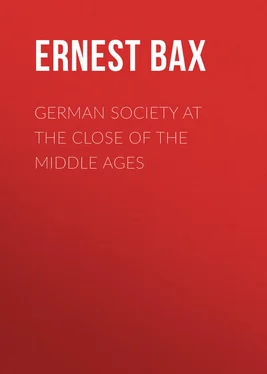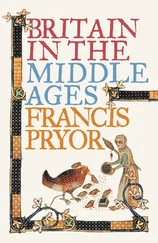Ernest Bax - German Society at the Close of the Middle Ages
Здесь есть возможность читать онлайн «Ernest Bax - German Society at the Close of the Middle Ages» — ознакомительный отрывок электронной книги совершенно бесплатно, а после прочтения отрывка купить полную версию. В некоторых случаях можно слушать аудио, скачать через торрент в формате fb2 и присутствует краткое содержание. Жанр: foreign_antique, foreign_prose, на английском языке. Описание произведения, (предисловие) а так же отзывы посетителей доступны на портале библиотеки ЛибКат.
- Название:German Society at the Close of the Middle Ages
- Автор:
- Жанр:
- Год:неизвестен
- ISBN:нет данных
- Рейтинг книги:5 / 5. Голосов: 1
-
Избранное:Добавить в избранное
- Отзывы:
-
Ваша оценка:
- 100
- 1
- 2
- 3
- 4
- 5
German Society at the Close of the Middle Ages: краткое содержание, описание и аннотация
Предлагаем к чтению аннотацию, описание, краткое содержание или предисловие (зависит от того, что написал сам автор книги «German Society at the Close of the Middle Ages»). Если вы не нашли необходимую информацию о книге — напишите в комментариях, мы постараемся отыскать её.
German Society at the Close of the Middle Ages — читать онлайн ознакомительный отрывок
Ниже представлен текст книги, разбитый по страницам. Система сохранения места последней прочитанной страницы, позволяет с удобством читать онлайн бесплатно книгу «German Society at the Close of the Middle Ages», без необходимости каждый раз заново искать на чём Вы остановились. Поставьте закладку, и сможете в любой момент перейти на страницу, на которой закончили чтение.
Интервал:
Закладка:
As Joss saw that he was obtaining the confidence of his neighbours, his denunciations of the evils of the time grew more earnest and impassioned. At the same time he threw out hints as to the ultimate outcome of the existing state of things. But it was only after many months that he ventured to broach the real purpose of his life. One day when they were all assembled round him, he hinted that he might be able to tell them something to their advantage, would they but pledge themselves to secrecy. He then took each individually, and after calming the man's conscience with the assurance that the proposal for which he claimed strict secrecy was an honourable one, he expounded his plan of an organisation of all the oppressed, an undertaking which he claimed to be in full accord with Holy Writ. He never insisted upon an immediate adhesion, but preferred to leave his man to think the matter over.
Joss would sometimes visit his neighbours in their houses, explaining to them how all ancient custom, right and tradition was being broken through to gratify the rapacity of the ruling classes. He put forward as the objects of the undertaking the suppression of the payment of interest after it had amounted to an equivalent of the original sum lent; also that no one was to be required to give more than one day's service per year to his lord. "We will," he declared, "govern ourselves according to our old rights and traditions, of which we have been forcibly and wrongfully deprived by our masters. Thou knowest well," he would continue, "how long we have been laying our claims before the Austrian Government at Ensisheim." 8 8 It will be seen from the historical map that Breisgau and Sundgau were feudal appanages of the house of Austria. Ensisheim was the seat of the Habsburg over-lordship in the district (not to be confounded with the imperial power).
From speaking of small grievances, Joss was gradually led to develop his scheme for the overthrow of feudalism, and for the establishment of what was tantamount to primitive conditions. At the same time he gave his hearers a rendezvous at a certain hour of eventide in a meadow, called the Hardmatte , which lay outside the village, and skirted a wood. The stillness of the hour, broken only by the sounds of nature hushing herself to rest for the night, was, at the time appointed, invaded by the eager talk of groups of villagers. All his little company assembled, Joss Fritz here, for the first time, fully developed his schemes. In future, said he, we must see that we have no other lords than God, the Pope, and the Emperor; the Court at Rothweil, he said, must be abolished; each must be able to obtain justice in his native village, and no churchman must be allowed to hold more than one benefice; the superfluity of the monasteries must be distributed amongst the poor; the dues and imposts with which the peasants are burdened must be removed; a permanent peace must be established throughout Christendom, as the perpetual feuds of the nobles meant destruction and misery for the peasants; finally, the primitive communism in woods, pasture, water, and the chase must be restored.
Joss Fritz's proposals struck a sympathetic chord in the hearts of his hearers. It was only when he wound up by insisting upon the necessity of forming a new Bundschuh that some few of them hung back and went to obtain the advice of the village priest on the matter. Father John (such was his name) was, however, in full accord in his ideas with Joss, and answered that the proposals were indeed a godly thing, the success of which was foretold in the Scriptures themselves.
The meetings on the Hardmatte led to the formation of a kind of committee, composed of those who were most devoted to the cause. These were Augustin Enderlin, Kilian Mayer, Hans Freuder, Hans and Karius Heitz, Peter Stublin, Jacob Hauser, Hans Hummel – Hummel hailed from the neighbourhood of Stuttgart – and Hieronymus, who was also a stranger, a journeyman baker working at the mill of Lehen, who had travelled far, and had acquired a considerable fund of oratory. All these men were untiring in their exertions to obtain recruits for the new movement. After having prepared the latter's minds, they handed over the new-comers to Joss for deeper initiation, if he thought fit. It was not in crusades and pilgrimages he taught them, but in the Bundschuh that the "holy sepulchre" was to be obtained. The true "holy sepulchre" was to be found, namely, in the too long buried liberties of the people. The new Bundschuh , he maintained, had ramifications extending as far as Cologne, and embracing members from all orders.
Joss Fritz had indeed before coming to Lehen travelled through the Black Forest and the district of Speyer, in the attempt, by no means altogether unsuccessful, to reunite the crushed and scattered branches of the old Bundschuh . Among the friends he had made in this way was a poor knight of the name of Stoffel, of Freiburg. The latter travelled incessantly in the cause; he was always carefully dressed, and usually rode on a white horse. The missionaries of the Bundschuh , under the direction of Joss Fritz, assumed many different characters; now they were peasants, now townsmen, now decayed knights, according to the localities they visited. The organisation of the movement was carried out on lines which have been since reproduced in the Fenian rising. It was arranged in "circles," the members of which knew one another, but not those outside the "circle". Even the beggars' guild was pressed into the service, and very useful adjuncts the beggars were, owing to their nomadic habits. The heads of the "circles" communicated with each other at intervals as to the number of recruits and as to the morale of their members. They compared notes with the two leaders of the movement, Joss and his friend Stoffel, both of whom rode constantly from place to place to keep their workers up to the mark. The muster-roll would be held on these occasions, as at Lehen itself, after dark, and in some woodland glade, near the village. The village taverns, generally the kitchens of some better-to-do peasant, were naturally among the best recruiting grounds, and the hosts themselves were often heads of "circles". Strange and picturesque must have been these meetings after nightfall, when the members of the "circle" came together, the peasants in their plain blue or grey cloth and buff leather, the leaders in what to us seem the fantastic costumes of the period, red stockings, trunk-hose and doublet slashed with bright yellow, or the whole dress of yellow slashed with black, the slouch hat, with ostrich feather, surmounting the whole; the short sword for the leaders, and a hoe or other agricultural implement for the peasant, constituted the arms of the company.
There was a visible sign by which the brethren recognised each other: it was a sign in the form of the letter H, of black stuff in a red field, sewn on to the breast-cloth. There appears also to have been another sign which certain of the members bore instead of the above; this consisted of three cross slits or slashes in the stuff of the right sleeve. This Bundschuh , like the previous one in Untergrünbach, had its countersign, which, to the credit of all concerned, be it said, was never revealed, and is not known to this day. The new Bundschuh was now thoroughly organised with all its officers, none of whom received money for their services.
The articles of association drawn up were the result of many nightly meetings on the Hardmatte , and embodied the main points insisted upon by Joss in his exhortations to the peasants. They included the abolition of all feudal powers. God, the Pope, and the Emperor were alone to be recognised as having authority. The Court at Rothweil and all the ecclesiastical courts were to be abolished, and justice relegated to the village council as of old. The interest payable on the debts of the mortgaged holdings of the peasants was to be discontinued. Fishing, hunting, woods and pasture were to be free to all. The clergy were to be limited to one benefice apiece. The monasteries and ecclesiastical foundations were to be curtailed, and their superfluous property confiscated. All feudal dues were to cease.
Читать дальшеИнтервал:
Закладка:
Похожие книги на «German Society at the Close of the Middle Ages»
Представляем Вашему вниманию похожие книги на «German Society at the Close of the Middle Ages» списком для выбора. Мы отобрали схожую по названию и смыслу литературу в надежде предоставить читателям больше вариантов отыскать новые, интересные, ещё непрочитанные произведения.
Обсуждение, отзывы о книге «German Society at the Close of the Middle Ages» и просто собственные мнения читателей. Оставьте ваши комментарии, напишите, что Вы думаете о произведении, его смысле или главных героях. Укажите что конкретно понравилось, а что нет, и почему Вы так считаете.










